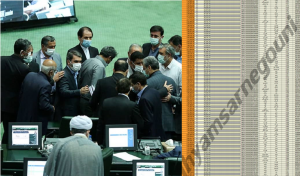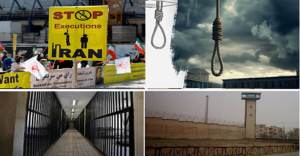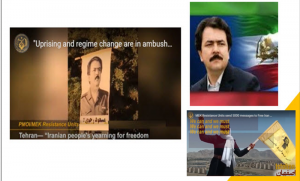(Video) Iran’s Majlis has no authority or practical use

After confidential documents of the Iranian regime’s Majlis were exposed , the regime declared that the Majlis is closed until March 4.The Speaker of the Majlis said, "if there is a need to amend the resolutions of the budget bill, a public session will be held.”

The most important project of the Majlis every year is supposed to be the review and approval of the budget bill, and the current budget bill has been the main subject of the regime’s media and the focus of conflict between the Majlis and the government.

The judiciary has also become a tool for persecution and execution. The components of the government and ministries are essentially instruments of the Supreme Leader’s authority and operate as appendages of the (IRGC) and the Ministry of Intelligence.
Sanctioned individuals granted the ability to change their identities to continue their activities, with financial incentives in banking, and customs domains.
On February 14, the state-run Tabnak newspaper wrote, “As a result, the public sessions of the Majlis have been postponed until after the elections; however, the Speaker of the Majlis, Mohammad Bagher Ghalibaf emphasized that if there is a need to amend the resolutions of the budget bill, a public session will be held.”
The most important project of the Majlis every year is supposed to be the review and approval of the budget bill, and the current budget bill has been the main subject of the regime’s media and the focus of conflict between the Majlis and the government.
Therefore, the closure of the Majlis amidst the heated discussions on the budget, and while the process of reviewing and approving this bill has not yet reached a conclusion, and the said bill should be approved before early March, could have significant implications.
The meaning of this closure is that neither the Majlis nor the budget bill have any meaningful implications. As evident from the disclosed documents, major decisions are communicated to the Majlis as government decrees from regime supreme leader Ali Khamenei and are implemented accordingly.
Members of the Majlis may outwardly assume a critical stance, but in practice, they unquestioningly approve orders and obey Khamenei without questioning. In some cases, they even forego the pretense and without any hesitation or the need for voting, simply request payment by sending a letter to Ghalibaf.
This is a fact that is acknowledged by the media and government elements themselves.
On February 13, the state-run Etemad newspaper wrote, “What has recently been observed in the scene of the country’s elections regarding disqualification movements in the Guardian Council (The body that oversees the elections) and the Majlis goes beyond mere staging and emptying the concept of elections, only being satisfied with its superficial aspects. What is currently happening goes beyond superficial appearances and has reached the point of fragmenting that same hollow symbol. This process is taking place with a specific purpose that others have a lot to learn from.”
In the current regime ruling Iran, it is not just the elections and the Majlis that have been treated as a hollow entity. This phenomenon also encompasses the executive and judicial branches, and there is no remaining intact and cohesive structure.
The judiciary has also become a tool for persecution and execution. The components of the government and ministries are essentially instruments of the Supreme Leader’s authority and operate as appendages of the Islamic Revolutionary Guard Corps (IRGC)2 and the Ministry of Intelligence.
On November 4, regime foreign minister Hossein Amir Abdollahian, in a highly confidential urgent letter to Khamenei, wrote, “According to the regulations, the executive bodies of the country are required to carry out all their actions in the field of foreign relations in coordination with the Ministry of Foreign Affairs, except for the armed forces, the Ministry of Intelligence, and the Atomic Energy Organization. This issue leads to inconsistency in the country’s foreign policy and reflects a message of weakening the authority and position of the Ministry of Foreign Affairs to other countries and international organizations. Please instruct all agencies to coordinate with the Ministry of Foreign Affairs in their foreign relations.”
On November 12, the head of the Office of the Supreme Leader, in a highly confidential letter, refers to the excessive demands of Amir Abdollahian, who had sought to “preserve his position” as the Minister of Foreign Affairs. The letter directs him to Ghalibaf and the Majlis, effectively dismissing him, and essentially implies that Amir Abdollahian should not overstep his boundaries or extend his influence beyond what is appropriate.
The medieval regime ruling Iran has no other destiny but downfall, although it attempts to emulate the governing mechanisms of the present era to make the ruling institutions of Iran appear compatible with the current age. This regime is an outdate phenomenon that, with the will of the Iranian people and the most enlightened children of this land, will be overthrown by the rebellious youth and resistance units.
On February 13, with 17 days left until the elections for the Assembly of Experts and the Parliament of the regime, the cyber group Ghiamsarnegouny (Persian for Rise to Overthrow) announced on its Telegram channel that it had seized control of the web server of the Khane Mellat News Agency, affiliated with the regime’s parliament.
The group also declared that it had taken control over 600 servers belonging to the parliament, while also releasing hundreds of pages of classified documents.
This group had previously targeted the systems of the regime’s Presidency, the Prison Organization, the Judiciary, the Ministry of Foreign Affairs, and dozens of other governmental agencies, exposing a wealth of information about the oppressive regime ruling Iran.
But the disclosure of the new batch of classified documents, particularly regarding the astronomical salaries of the parliament members, all paid out of the people’s pockets, appears to have deep societal ramifications.
A document obtained from the Majlis (regime’s parliament) reveals tactics for circumventing sanctions, allowing individuals to change their identities, manipulating purchase and customs documents, and mitigating damages using financial incentives. One particular document details strategies for bypassing sanctions and aiding involved parties.
The classified letter is signed by Mohammad Mirmohammadi, Deputy for Economy and Technology of the Secretariat of the Supreme National Security Council, and addressed to Mohsen Rezaee, Secretary of the Supreme Council of Economic Coordination. It discusses decisions made during the Counter-Sanctions Headquarters meeting in September 2023.
Copies of this letter were distributed to the heads of the three branches of government, including the Speaker of Parliament, as evidenced by the parliament’s stamped documents.
The Counter-Sanctions Headquarters mandates the Ministry of Intelligence to compile a list of sanctioned individuals every three months for approval by the Secretariat of the Economic Coordination Council.
Furthermore, in this document, customs structures are weakened to make it difficult to trace goods entering and leaving the country. In another step, “tax exemption for currency (both banknotes and checks)” is introduced, allowing anyone to bring any amount of currency into Iran. At the same time, pension funds and exchange offices will face increased surveillance to restrict people’s access to foreign currency for entering and exiting.
The Central Bank, according to this document, has received boundless capabilities to control banks and people’s money. Conversely, the Ministry of Intelligence is obliged to send a list of sanctioned officials and affiliates of the system to the Secretariat of the Supreme Council of Economic Coordination every three months.
The government is also given the possibility to support sanctioned officials and affiliates of the system. For example, they can use “the possibility of changing identity to continue personal activities” or receive “legal-judicial services” domestically and internationally and benefit from “informational-security coverage.”
Sanctioned individuals are granted the ability to change their identities to continue their activities, along with financial incentives in banking, insurance, tax, and customs domains.
Another resolution involves providing legal services domestically and internationally to support managers, agents, and individuals who are taking risks by traversing sanctions.
Methods for circumventing entry of sanctioned and dual-use goods are outlined, including altering documents and bypassing customs procedures. Customs authorities are allowed to modify declaration forms to safeguard information on imported goods.
Additionally, goods belonging to ministries, organizations, and government agencies can clear customs without a bank tracking code. Hoarding foreign currency is regulated, requiring companies with over $500 million in annual exports to use banking networks or obtain guarantees from exchanges.
These measures have established a covert financial system integral to Iran’s economy. Despite efforts to evade US sanctions, some individuals have been detained abroad for their involvement in such activities.
The Counter-Sanctions Headquarters was established in 2018 following the US withdrawal from the JCPOA, aiming to find solutions for selling oil and meeting the regime’s needs in new conditions.
To subscribe weekly Newsletter of NCRI, please use this link. https://bit.ly/3SMgEla
Shahin Gobadi
NCRI
+33 6 61 65 32 31
email us here
WATCH NOW: Members of the Majlis may outwardly assume a critical stance, but in practice, they unquestioningly approve orders and obey Khamenei without questioning. at https://www.youtube.com/shorts/dQMVPArjfsY?feature=share

1 https://www.ncr-iran.org/en/about-ncri/ncri/alternative/
2 https://www.ncr-iran.org/en/news/terrorism-a-fundamentalism/inside-irans-army-of-terror-and-oppression-revolutionary-guards-irgc-part-2/


